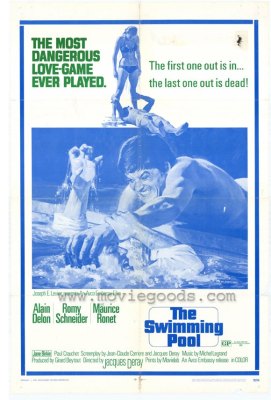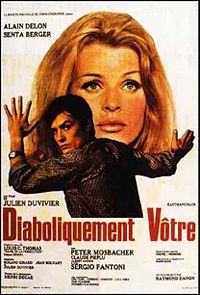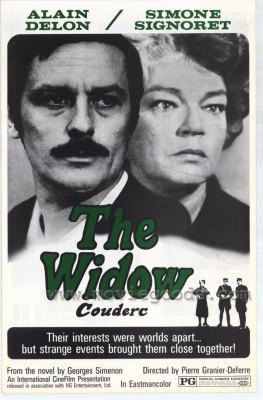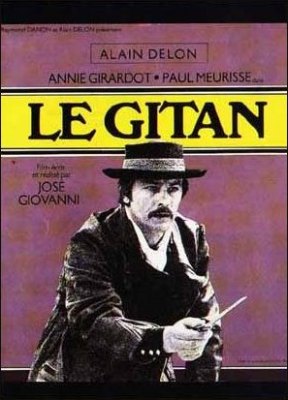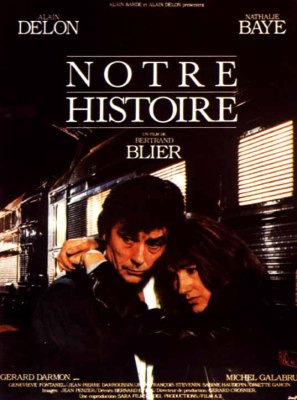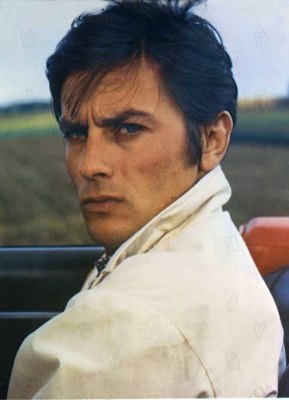| Reviews & Columns |
|
Reviews DVD TV on DVD Blu-ray 4K UHD International DVDs In Theaters Reviews by Studio Video Games Features Collector Series DVDs Easter Egg Database Interviews DVD Talk Radio Feature Articles Columns Anime Talk DVD Savant Horror DVDs The M.O.D. Squad Art House HD Talk Silent DVD
|
DVD Talk Forum |
|
|
| Resources |
|
DVD Price Search Customer Service #'s RCE Info Links |
|
Columns
|
|
|
Alain Delon - 5-Film Collection (The Swimming Pool / Diabolically Yours / The Widow Couderc / The Gypsy / Our Story)
The Swimming Pool
(Includes Mild Spoilers) Titled simply The Pool on the non-removable subtitles (see Video & Audio), this dark drama featuring a disturbingly realistic murder may have been the film in production near St. Tropez when on October 1, 1968, Delon's shady bodyguard was found murdered. Delon's movements were investigated and he was held for questioning, though he was never charged with the crime. Nevertheless, the scandal was the talk of Europe for many months and never entirely went away, cementing Delon's dangerous image and forever blurring his offscreen life to film roles like Purple Noon (Plein Soleil, 1960).
The Pool reunites Delon with his Purple Noon co-star, Maurice Ronet, and Delon's real-life former lover, Romy Schneider. Delon is Jean-Paul, a failed writer, recovering alcoholic who had attempted suicide but who now apparently is blissfully happy vacationing on the French Rivera with Marianne (Schneider), with whom he has lived with for two-and-a-half years but never married. Theirs is an intensely sexual relationship.
But she's also the former lover of Jean-Paul's longtime friend, record company executive Harry (Ronet) who suddenly shows up with a long-estranged 18-year-old half-English daughter, Penelope (Jane Birkin). Though Jean-Paul and Marianne enjoy a sophisticated, open relationship, Harry's open and unpleasant advances on Marianne begin to quietly rattle Jean-Paul, and in response he begins seducing Penelope.
At 121 minutes The Pool is rather sluggish and perhaps a bit too understated. Despite the emotional upheaval described above and the fact that there's a murder a bit more than halfway through the film, no one so much as raises their voice, and most of the anger and feelings of betrayal, etc. go unstated.
The picture is very much everyone's idea back in the late-1960s of what a French art house-type movie was supposed to be. Delon and Schneider are very sexy together in scenes of poolside love-making, there's some nudity, and it subtly touches on heretofore taboo issues that were only beginning to be depicted in American movies: adultery, rough sex, creepy incestuous longings. Characters bask in their French Riviera villa among cool cars (Harry drives, I think, a 1968 De Tomaso Mangusta), eating exotic Chinese food (with Uncle Ben's Instant Rice, however) surrounded by swingin' '60s furniture people pay a fortune for these days.
Director Jacques Deray's approach is a little too leisurely, but the performances he gets are terrific all-around and the psychological games at play are handled with realism and finesse. The murder is quite disturbing realized precisely because it's not premeditated. A not-unusual situation gets out of control, one thing leads to another, a kind of casual but relentless expression of anger sets in, and minutes later someone is dead.
Diabolically Yours
Julien Duvivier's last film, released a few months after he was killed in a car accident, is a pretty good if improbable psychological thriller, one rather like the contemporaneous Italian giallo genre. Georges Campo (Delon) awakens from a three-week coma following a near fatal car accident (ironic, given the fate of its director). He's told that his wife, Christiane (Senta Berger), was also in the vehicle but thrown clear and uninjured. He's eventually taken back to the family's expansive estate out in the country, where they're joined by family friend Freddie (Sergio Fantoni), a physician. Problem is Georges can't remember anything, though he withholds this information from the hospital stuff.
Without giving anything away, something's not quite right and the film chiefly is one of those "what exactly is going on here?" puzzles. Is Georges really suffering from amnesia or faking it? Is he conning Christiane and Freddie or are they conning him? Is he really Georges or some kind of doppelganger? Georges allegedly had been living in Hong Kong for years until just before the accident, so why is he dreaming about Algiers? What's with the strange disembodied voice in his bedroom? Who's trying to kill him, and why?
The answer to this mystery is a bit of a disappointment but getting there, as they say, is half the fun, and the (somewhat abrupt) resolution is fairly clever, just not up to the level of the film's early and best scenes establishing the mystery. (It also doesn't hold up to retrospective scrutiny.)
Diabolically Yours is best enjoyed with no expectations beyond that of a standard giallo-type thriller. The absurdity that occasionally is part of the enjoyment of such films is on display in the form of the Campo's Chinese houseman Kim, played by the emphatically German-born Peter Mosbacher, the worst pseudo-Asian casting since Welshwoman Yvette Rees in The Curse of the Fly (1965).
It's not up to Duvivier's best work but so what? There's plenty of visual style and the picture is never dull. Delon is quite good, too: for the longest time, you're not sure if he's playing along with his maybe-wife and best pal until he can figure out what's going on, or whether he's got some grand Purple Noon/Plein soleil plan up his sleeve.
The Widow Couderc
Adapted by director Pierre Granier-Deferre from the Georges Simenon novel, The Widow Couderc is set in 1934 France and explores an engrossing relationship between the mysterious, handsome Jean (Delon), who may be an escaped convict, and the "widow Couderc Tati" (Simone Signoret), a much older peasant farmer - Delon was 35 at the time, she was 50 but looks considerably older.
A former servant to a family whose father and son raped her in turn; the widow eventually married the latter and, after his death, inherited a house on one section of property bisected by a heavily traversed canal. In the opening scene, Jean helps the widow carry a heavy incubator back to the farm, and she offers him a job as a farmhand. (The film may have been an influence on Yoji Yamada's excellent if more sentimental A Distant Cry from Spring, 1980. The two would make an interesting double-bill.)
Eventually they become lovers; constantly at odds with her sister-in-law's family on the other side of the canal, the widow appreciates his forthrightness even about his affair with the sister-in-law's sluttish daughter (Ottavia Piccolo), a singer mother.
The protagonists' relationship is both unusual and highly believable, the kind of thing that was socially unacceptable yet probably widespread among lonely outcasts. Outwardly she's a very hard woman, pushing back at her estranged family-by-marriage across the canal as they collectively muster against her. So lonely is she that it's implied that before meeting Delon's character she'll occasionally sleep with her own horny father-in-law (Jean Tissier), the semi-senile old man that had raped her all those years before. And yet Jean quickly recognizes the gentle woman beneath the gray hairs and weathered, craggy features.
The film and the two leads do a marvelous job conveying a sense of time and place; they're not only completely believable as star-crossed lovers, Signoret is totally convincing as a peasant farmer occupied with mundane, daily chores, and both the script and the production design (by Jacques Saulnier) play extremely authentic to the period. A genuine atmosphere of prewar France is conveyed, and the fascist undercurrent - for example, a neighborhood church has written in big letters on the side of the building, "The House of God is Not for Jews," while others assume Delon's character is a Communist or other political undesirable.
Delon gives a fascinatingly enigmatic performance, saying little but stating much with his simple actions, and he's quietly intense in a manner reminiscent of the actor Robert Shaw. It's a unique characterization; can you imagine any top Hollywood star of the early '70s willing to risk his image by falling in love with an aging hag?
The film makes superb use of its unique location, a village/commune called Cheuge, in the Cote-d'Or departement of eastern France. Also noteworthy is its lovely, delicately spare score by Philippe Sarde (Tess, numerous films with Bertrand Tavernier)
The Gypsy
Delon is on the lam once again in The Gypsy, an uneven and somewhat unusual though reasonably satisfying thriller. Ironically, Delon's character is probably the film's weakest component, and he has much less screentime here than in any of the other films in this collection.
Angry Gitan (that is, Romani Gypsy) Hugo Sennart (Delon), better known as, simply, "The Gypsy," has escaped from prison where he was serving a life sentence after killing the mayor of a French town that evicted his nomadic people. Accompanied by two non-gypsy criminals, Jo "The Boxer" Amila (Renato Salvatori) and Gene Newman (Maurice Barrier? He's called something else in the French version), the escaped cons are responsible for a string of daring, daytime armed robberies, Hugo using his booty to help his gypsy family, camped out in trailers in an industrial slum area. (As with most of the films in this set, actor-producer Delon must have loved helicopter shots. Elaborate aerial views appear in nearly all five films, this being the best example. The film fades in to a luxurious beach on the South of France, then pulls further and further inland until we see the gypsy slum about a mile from shore - very effective.)
Meanwhile, world-weary, sophisticated and wealthy safecracker Yan Kuq (Paul Meurisse) returns home after a big score to find his young wife on the phone with her lover, a cop (Bernard Giraudeau) no less. There's an argument, he begins hitting her, and she accidentally falls off their penthouse balcony to her death.
As Police Inspector Blot (Marcel Bozzuffi) tries to build a case against Kuq and arrest The Gypsy, something odd begins to happen. Purely coincidentally, over the next few weeks Hugo and Yan are in the same immediate vicinity, never quite bumping into one another. The police - racist, corrupt, and unsympathetic - assume the two are working together but they're not, though their paths will cross eventually.
The Gypsy is nicely played by its cast and as a thriller it's entertaining, but it's also very heavy-handed with regard to the Gitans. Delon is a kind of pissed-off Robin Hood in this, forever giving angry sermons about how gypsies are badly treated by society, worse than dogs he says. In a completely unbelievable, overly symbolic scene late in the film a wounded Hugo, shot by the police, falls unconscious after pointing his gun at a veterinarian (Jacques Rispal) demanding he patch up his wounds. Not only does the vet stitch him up when he could easily and understandably have called the cops, in the end he gives Hugo his gun back and refuses to take any money from Hugo, all because there are "two sides to every story." I'll bet.
On the other hand Meurisse (Diabolique), in his last film, delivers a marvelously understated performance as veteran thief Yan Kuq. It's a far more interesting character and thankfully there's at least as much of him as there is of Hugo. When the two very different characters come together near the end, the film really shines. Yan's longtime on-again, off-again relationship with a hotel proprietress (Anne Giradot) is likewise very interesting and the two actors are superb in their scenes together.
Our Story (a.k.a. Separate Rooms)
Well, four out of five ain't bad. Our Story follows alcoholic Robert Avranche (Delon) as he obsessively imposes himself into the life of 33-year-old divorcee Donatienne (sexy Nathalie Baye, Le petit lieutenant), following her home and wreaking havoc all over her neighborhood, etc., "You may be a bitch," he insists, "but you've got the face of an angel." She claims to be bored, that she has no use for him and anyway is in love with Duval (Gerard Darmon), who treats her like shit.
The story is set in motion after she propositions Robert on a train line she haunts for non-committal impromptu sex, a means to cope with the depression that followed her divorce and loss of her child in a presumed custody battle. Both awkwardly talk about themselves in the third person, as protagonists in stories they cannot control.
Robert's obsession reaches the point where the entire neighborhood erupts into pandemonium, with much shouting, sleeping around, broken glass and bookshelves and, in Delon's case, non-stop beer-guzzling. The result, I guess, is intended to be funny and insightful about human relationships, something beguilingly eccentric and witty, but this reviewer only found it mindless and boring, as grating on one's patience as similar mindlessness found in Stay Away Joe, Elvis Presley's would-be Indian reservation farce.
Nevertheless, director Bertrand Blier (Get Out Your Handkerchiefs) pulled a Cesar-winning performance out of Delon and picked up one himself for his screenplay. It's not one of Delon's better performances though: he mostly sits around glassy-eyed in a drunken stupor, staring into space. Maybe there's some clever dialogue that doesn't translate well into English.
Critic Firat Yucel writes, "As usual, Blier is asking questions about the difficulty of controlling one's own destiny while trying to remain within the limits of moral codes. The director once again attacks the clichés of daily life and shows to what extend (sic) the experience of love depends on those clichés." Maybe so, but I found Our Story an almost complete waste of time and talent, while allowing that this may be more a question of personal taste, and others may find it rewarding on some level.
Video & Audio
All five films are 16:9 enhanced, generally look great, and bear Studio Canal logos at their heads. The Swimming Pool is cropped on the sides to an aspect ratio of about 1.70:1 and shows bits of wear and damage at the ends of reels, but the color is fine and the image reasonably sharp. Diabolically Yours has thicker black bars at the sides, approaching a 1.66:1 aspect ratio throughout. The Widow Couderc starts out with more extreme copping for the titles (closer to 1.66:1 than Diabolically Yours) then goes to 1.78:1 for the remainder of the film, though the compositions don't suffer. The rest of the films are 1.78:1 throughout. The films are spread over three discs (with The Swimming Pool going solo) and include English and Spanish subtitles.
The Swimming Pool's English subtitles are non-removable but all the other films are. In this case, though the optional Spanish subs uncomfortably are positioned at the top of the frame, hovering above the English ones. There are no Extra Features
Parting Thoughts
Despite my dislike of Our Story, the other four films more than compensated and this is a real bargain considering the price, quality of the transfers, and relative obscurity of the films. Highly Recommended.
Film historian Stuart Galbraith IV's latest books, Japanese Cinema and The Toho Studios Story, are now available for pre-order.
|
| Popular Reviews |
| Sponsored Links |
|
|
| Sponsored Links |
|
|
| Release List | Reviews | Shop | Newsletter | Forum | DVD Giveaways | Blu-Ray | Advertise |
|
Copyright 2024 DVDTalk.com All Rights Reserved. Legal Info, Privacy Policy, Terms of Use,
Manage Preferences,
Your Privacy Choices | |||||||









